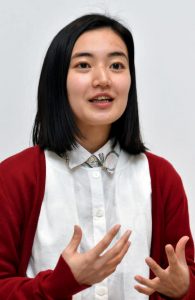Views on Ukraine invasion from A-bombed Hiroshima’s perspective: Miho Tanaka, 27, joint representative of Kakuwaka Hiroshima, a group of young voters in Hiroshima working to understand nuclear policies
Apr. 6, 2022
Dialogue must continue despite differing opinions
by Kana Kobayashi, Staff Writer
Many lives have been lost. Ukrainian people are desperate to escape the shelling. After having a chance to see actual footage in real time of the tragedy happening in Ukraine posted on social media, I poignantly sensed the reality of the war. Even the threats by Russia, a nuclear superpower, to use nuclear weapons have become real in a sense. I am convinced of the need to spread the message that we need to rid the world of nuclear weapons.
Taking advantage of the horrific situation in Ukraine, more and more people in Japan have started to discuss adoption of a nuclear-sharing policy, which would allow Japan to jointly manage nuclear weapons with the United States. Rather than pointing out the risks and disadvantages of such a policy, these debates stress the need for nuclear deterrence. Based on my realization of the gravity of the situation, I held an urgent meeting with group members and released our messages of protest against that kind of thinking through social media and other platforms.
However, it is the reality that many of the comments we have received on the Kakuwaka Hiroshima website express opposition to our ideas. Some people point out how incomprehensible it is for us to take such a stance despite the situation in Ukraine or decry our opinions regarding the abolition of nuclear weapons in the face of what is happening now in Ukraine. Even though opinions on this issue may differ, the only thing we can all do is to continue to carry out respectful dialogue. Our group replies to each message and continues to inform people of the problems involved with the idea of nuclear sharing, which could engender further nuclear proliferation, and the reasons behind our calls for the total elimination of nuclear weapons.
Russia’s invasion of Ukraine is an example of power run amok. Precisely because the same situation could also happen in Japan, it is important for all of us to keep our eyes on power. Since the founding of Kakuwaka Hiroshima in 2019, we have asked Diet members of the Japanese parliament and candidates for national elections from Hiroshima Prefecture about their nuclear policy positions and shared their responses with the public. Individual voters elect those who hold power and prevent abuses of power. Young people tend to be less interested in the electoral process, but I truly hope they can keep their eyes firmly fixed on politics.
In June, the First Meeting of States Parties to the Treaty on the Prohibition of Nuclear Weapons (TPNW) was held. The national government of the A-bombed nation of Japan did not even consider attending the meeting, even as an observer nation. To achieve a world without nuclear weapons, an aim advocated by our own government, we must continue urging it to join the treaty. Although we cannot communicate the tragedy of the atomic bombings with the same sense of reality as can the A-bomb survivors, we of the younger generations can study and learn about international law as well as the inhumane nature of nuclear weapons and raise our voices.
The situation in Ukraine has made the world keenly aware that damage caused by nuclear weapons is not only a thing of the past, and that anyone could become a victim so long as nuclear weapons exist. That is why we intend to continue lifting our voices in unison with young people around the world. We dare to do so to meet the expectations of A-bomb survivors, who have encouraged us by wishing us the best of luck and sharing their persistent suffering over the 77 years since the atomic bombings.
Profile
Miho Tanaka
Born in 1994. Originally from Kitakyushu City in Fukuoka Prefecture. She came to Hiroshima for work in 2017 and founded the group Kakuwaka Hiroshima with local company workers, students, and café owners in Hiroshima and its surrounding areas in 2019. The group, with its 15 members at present, has asked Japanese Diet members and candidates running in the national elections from Hiroshima Prefecture about their nuclear policies and released their responses to the public. The group has also held online events focusing on the TPNW.
(Originally published on April 6, 2022)








